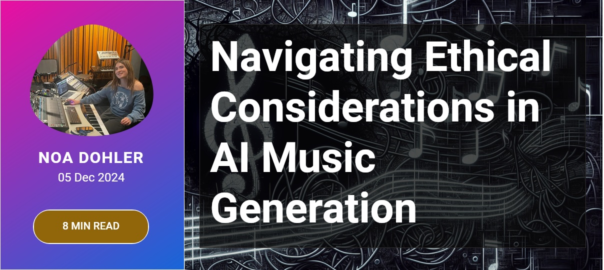Mubert AI revolutionizes music creation with boundless potential.
While many view AI music as a threat to human creativity, pioneers are discovering its potential to enhance artistic expression. As explored in our discussion about human-AI collaboration in music composition, these tools are becoming powerful allies for musicians seeking innovative approaches.
During a recent performance, I integrated AI-generated harmonies into my piano composition. The audience was captivated, unaware that the ethereal background textures were AI-crafted. It sparked fascinating discussions about the future of musical collaboration.
The Cultural Impact of AI Music Generation
The integration of AI in music creation is fundamentally reshaping our cultural landscape. Studies show that AI music generators are empowering creators across various genres, democratizing music production and enabling new forms of artistic expression. This technological revolution is breaking down traditional barriers to entry, allowing aspiring musicians to experiment with sophisticated compositions without extensive formal training. The emergence of AI music tools has led to a surge in cross-genre experimentation and unique sonic landscapes. The accessibility of these platforms has created a new generation of creators who blend traditional musicianship with AI-driven innovation. This fusion is giving rise to entirely new musical genres and creative possibilities. The cultural impact extends beyond just creation, influencing how we consume and interact with music. AI’s ability to generate personalized soundtracks and adaptive music is transforming the listening experience, making it more interactive and tailored to individual preferences.
Ethical Considerations in AI Music Creation
The ethical landscape of AI music generation presents complex challenges that demand careful consideration. As highlighted by industry experts, questions of authorship and creative rights are at the forefront of this technological revolution. The need to balance innovation with artistic integrity has become increasingly crucial as AI lofi music generators gain popularity. The industry must address concerns about potential exploitation of existing works and the preservation of human creativity. These ethical considerations extend to questions of transparency and attribution in AI-generated music. Artists and platforms must clearly communicate when AI tools have been used in the creative process, maintaining trust with audiences while embracing technological advancement. The development of ethical guidelines is essential for ensuring that AI music tools enhance rather than diminish the value of human creativity.
Navigating Copyright in the AI Music Era
The evolution of AI music technology has created unprecedented challenges in copyright law. Research indicates that generative models raise significant concerns about copyright infringement and ownership rights. These issues require careful consideration to protect both human creators and AI-generated content. Legal frameworks must adapt to address the unique characteristics of AI-generated music. Questions of ownership, attribution, and fair use become increasingly complex when dealing with content created through machine learning algorithms. The industry needs clear guidelines to determine rights and responsibilities. Establishing robust copyright protection mechanisms while fostering innovation is crucial. This balance requires collaboration between legal experts, technologists, and music industry professionals to develop frameworks that protect creative rights while encouraging technological advancement.
Building Ethical Frameworks for AI Music
The development of comprehensive ethical guidelines for AI music creation is essential for sustainable industry growth. Studies from the OECD emphasize the importance of responsible AI integration in the music industry. These frameworks must address issues of transparency, accountability, and fair compensation for all stakeholders. Implementation of ethical guidelines requires collaboration across sectors. Industry leaders, artists, and technology developers must work together to establish standards that protect creative rights while fostering innovation. This collaborative approach ensures that ethical considerations are embedded in the development process. Education and awareness about ethical AI music creation are crucial. Musicians, producers, and consumers need to understand both the capabilities and limitations of AI music tools, ensuring responsible use and development of these technologies.
Future Business Models in AI Music Innovation
Innovative companies could develop AI-powered music licensing platforms that automatically generate and license custom music for different use cases. This service could target content creators, advertisers, and businesses needing unique, royalty-free music while ensuring fair compensation for artists who contribute to the training data. Startups could create collaborative AI music tools that enable real-time interaction between human musicians and AI systems during live performances. This technology could revolutionize live entertainment and create new performance possibilities. Companies could develop AI-driven music education platforms that adapt to individual learning styles and progress. These systems could provide personalized instruction, generate practice exercises, and offer real-time feedback, creating a new paradigm in music education.
Shaping Tomorrow’s Music Landscape
The future of music lies at the intersection of human creativity and AI innovation. As we navigate this exciting frontier, your voice matters in shaping how these technologies evolve. Share your thoughts on AI music generation – how do you envision it enhancing your creative process? Let’s collaborate in building a future where technology amplifies human artistry rather than replacing it.
Essential FAQ About AI Music Generation
Q: What is Mubert AI and how does it work?
A: Mubert AI is an artificial intelligence platform that generates unique music using advanced algorithms and machine learning. It analyzes patterns from existing music to create new compositions in real-time.
Q: Can AI-generated music be copyrighted?
A: Yes, AI-generated music can be copyrighted, but ownership rights vary by platform and jurisdiction. Currently, most platforms assign rights to the human user who initiated the creation.
Q: Is AI music making human composers obsolete?
A: No, AI music tools are designed to complement human creativity, not replace it. They serve as collaborative tools that enhance the creative process while maintaining the irreplaceable human element in music creation.
